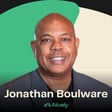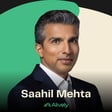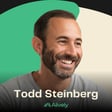
How Hollywood Stars Get In Shape with Don Saladino - E28
Are you looking to transform your body? Do you want to get fitter, stronger and live a healthier lifestyle? Then who better to take advice from than Hollywood's go-to fitness guru? Whether you're a fitness enthusiast or just curious about how your favorite action stars get into jaw-dropping shape, this episode pulls back the curtain on the methods of one of the most trusted names in celebrity fitness transformation. You'll learn about the importance of muscle maintenance, the right diet, and why building healthy habits all round is key to not only looking, but also feeling your best.
Don Saladino is a fitness coach for the stars, with 26 years of experience under his belt. Cutting his teeth as a collegiate baseball player, Don's obsession with fitness quickly transformed him into the go-to guy for getting in shape, strong and living a healthier lifestyle. Over the years, he has transitioned into an entrepreneurial role within the fitness industry, creating and leading successful training programs. He has trained some of the biggest names in Hollywood, including Deadpool star Ryan Reynolds, Captain America's Sebastian Stan and Gossip Girl's Blake Lively. Regularly featuring in publications such as Men's Health, and Muscle & Fitness, as well as doing live fitness demos on The Today Show, Good Morning America and E News, Don has become a household name to celebrities and more.
“I believe the best way to detox the body is not through starving it, it's through nutrition.” - Don Saladino
In this episode you will learn:
- How Don's personal journey from athlete to fitness entrepreneur began and evolved, including his motivations and early influences.
- The significance of developing muscle for longevity and overall health, and why it's essential to focus on muscle maintenance as we age.
- Don’s training and nutrition philosophy, including detailed insights into his daily routines, workout structure, and how he integrates recovery techniques.
- The importance of mindset and discipline in achieving long-term health goals, and how Don approaches goal setting and motivation.
- The role of social connection and community in overall well-being, as emphasized through Don’s experiences in creating supportive fitness environments.
- Practical strategies for beginners to get started on their health journey, focusing on incremental changes and building sustainable habits for lasting impact.
Resources
- Connect with Don on Instagram: https://www.instagram.com/donsaladino/
- Join Don’s programs and see what he has to offer: https://donsaladino.com/
- Shop all the products Don mentions in the episode: https://alively.com/products/don-saladino
This podcast was produced by the team at Zapods Podcast Agency:
https://www.zapods.com
Find the products, practices, and routines discussed on the Alively website:
https://alively.com/


















